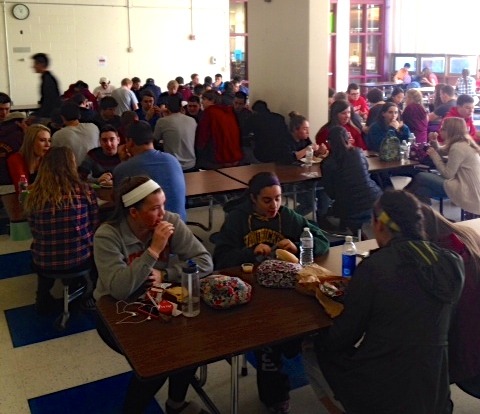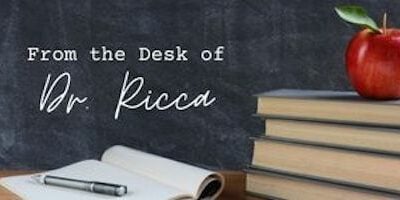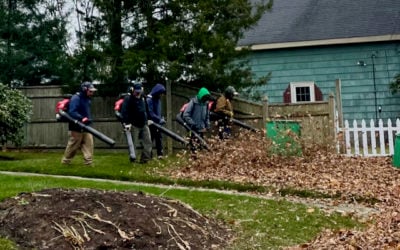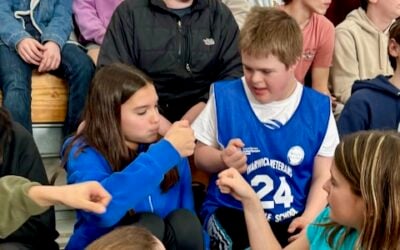How we educate young learners has become a constant topic to be scrutinized in recent years. Some are calling for reform, while others demand a return to the basics. All the while the twin specters of Testing and Technology wield double-edged swords, promising a 21st Century education as many young people fall prey to maladies brought on by stress. Politicians, pundits, testing companies, parents, teachers and young people all have their opinions.
In spite of this there is still lunch.
A significant portion of my time as a counselor is spent in the East Greenwich High School cafeteria. Oh sure, I run a bunch of clubs, see clients and offer a host of community initiatives like Youth to Youth, Parent Forums, etc., etc.… But, none of them are more important than visiting the lunchroom.
Yogi Berra once said, “You can observe a lot by just watching.” To a large extent “hanging out” at lunch captures the essence of this convoluted wisdom.
Each school day I position myself near the steps just outside the nurse’s office around 11 a.m. By doing so I am in position to watch every direction students will come from on their way to the cafeteria. As they start coming I get to see, shake hands and chat with scores of kids. I also get to connect with those who are feeling up or down in a conversational tone (rather than a “come into my office” sort of thing).
Once the stampede to the lunchroom ends, it is now time to enter the cafeteria, where again, much can be learned. All of this takes so very little time. All of this takes lots of time. Yogi Berra would be proud of me.
For most, the cafeteria is a place where friends can meet and discuss all sorts of things. For some, it is about grouping and/or isolation. A lot is going on in that brief 20-minute (or so) time. Much of this plays a role in how kids perceive themselves as well as others. That is why it is so important for adults to check in from time to time. A minute here or there might bring connection and understanding. Lunchtime is also a great deal of fun.
All too often adults lose sight of the developmental and social aspects of education. Abraham Maslow expressed the notion of a “Hierarchy of Needs,” which asserted that if basic needs were not taken care of, achieving one’s highest levels for success would be truncated. With this said, ignoring young people’s needs for security, connection and purpose will have a negative impact on academic and social development.
Jacques Cousteau, who did much to bring the undersea world into public view, has always been a hero of mine. Cousteau recognized the importance of respecting and caring for a world we can pay a visit to but cannot stay in. To a large extent, adults must recognize that there is a youth pulse and language that resides outside of theirs. Adults can visit. Adults can guide and support. Adults make huge mistakes when they impose policies that interfere with normal child development. Sometimes, much can be learned from the kids – again, just by watching. Cousteau understood that a great deal could be done to support the oceans, but in the end he had to come back to land. This is a notion that adults should embrace. Adults being adults, while respecting childhood, is an imperative dynamic for establishing a young person’s sense of security.
Schools are often under pressure to produce great test scores, increase the number of Advanced Placement courses and tie technology into daily learning. While that’s well intended, it should be noted that lunch is important too. Not only lunch, but relationships, critical thinking, creative expression and interpersonal exploration are essential as well. Schools need to be rewarded for more than the accoutrements of success. Being a place where kids thrive in multiple arenas should be factored into how we measure a school’s effectiveness.
Finally, Yogi Berra profoundly said, “We made too many wrong mistakes.” Again, while absurd, there is some logic in these words. Some mistakes take us towards learning (like Edison’s trials and errors with the light bulb) while others stifle it. The latter type errors usually include those that are fear and control based. Sorting out the “wrong mistakes” is something that should be looked at. Perhaps we can do it over lunch.
Contributor Bob Houghtaling works with young people, parents and community members in East Greenwich.






 Subscribe
Subscribe
Critical thinking, creative expression and interpersonal exploration, etc. are part of the secondary program in leading countries.